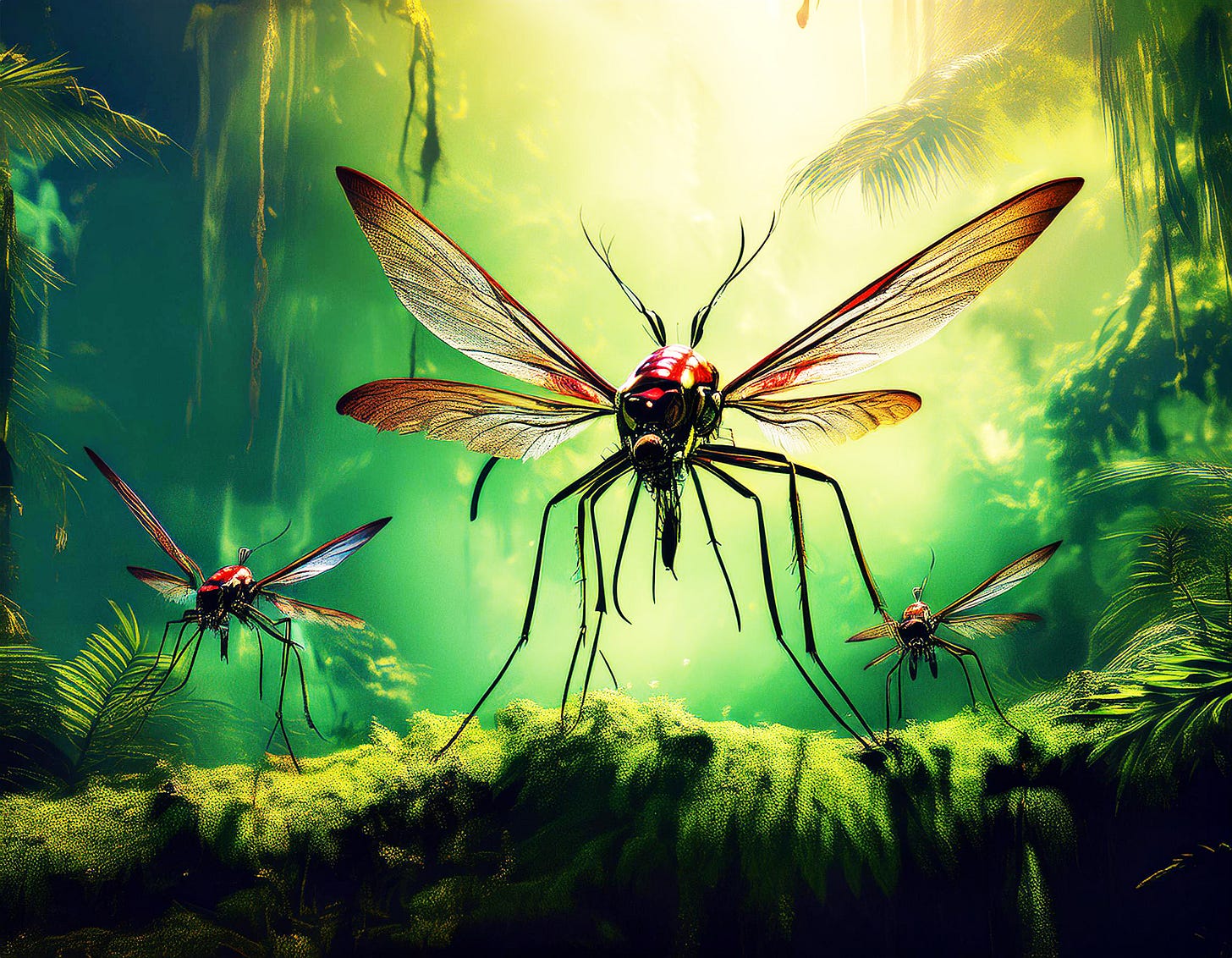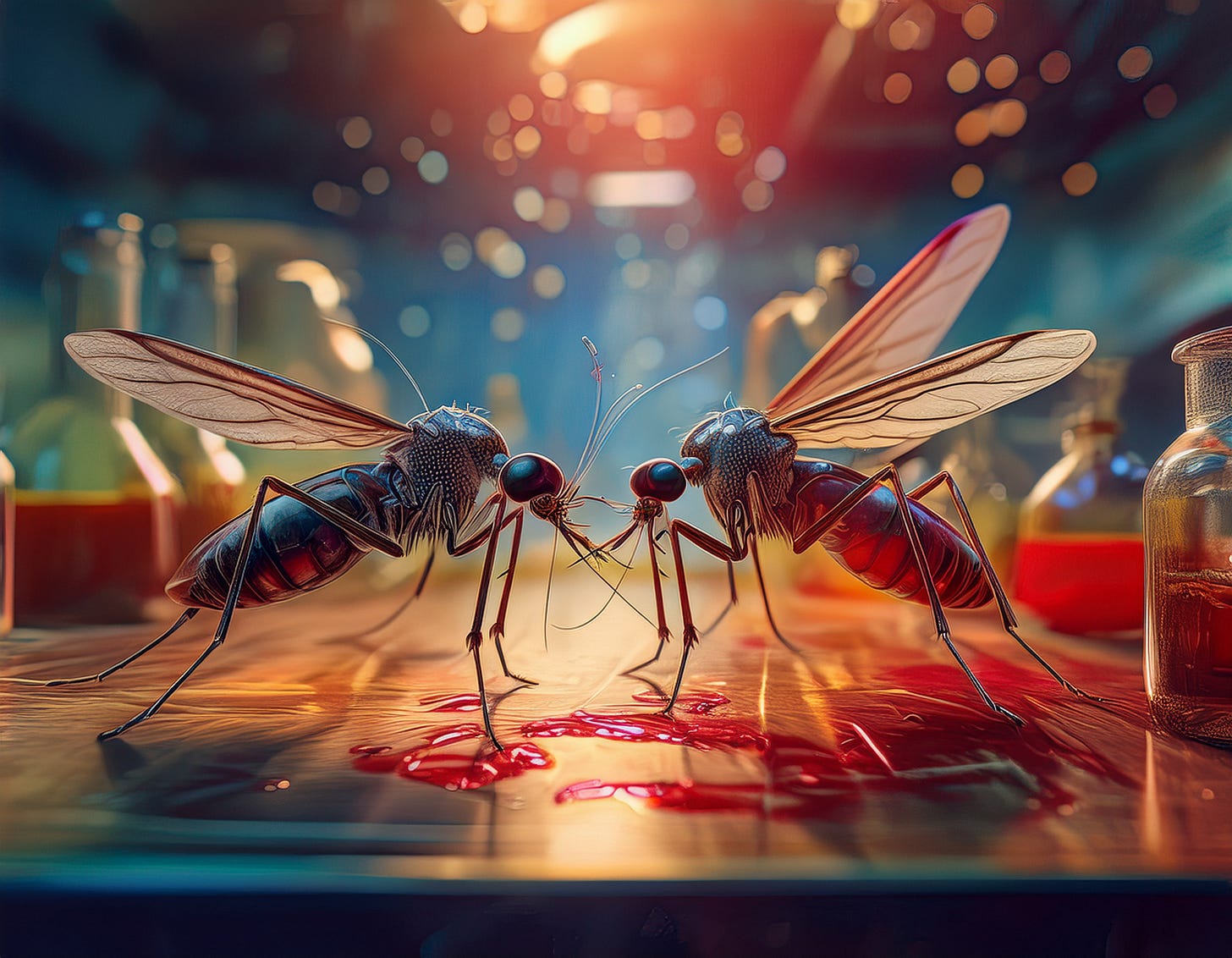Hawai'i's 2025 State Wildlife Action Plan Survey: Say NO to Lab-Altered Mosquitoes
Speak out against the release of dangerous experimental mosquitoes in Hawai‘i
Last week, the State of Hawai‘i Department of Land and Natural Resources (DLNR) held two Zoom meetings as part of the public review process for the 2025 State Wildlife Action Plan (SWAP). We were given an opportunity to ask questions about the SWAP process and provide feedback about our concerns regarding conservation efforts.
The meetings gave an overview of the SWAP, a “conservation strategy for over 10,000 native species and their ecosystems.”
“The SWAP is a comprehensive statewide framework for conserving species and habitats. Updated every 10 years, the SWAP identifies ‘Species of Greatest Conservation Need’ and outlines voluntary, proactive strategies for protection and restoration.”
“The SWAP plays a key role in securing federal funding through the State and Tribal Wildlife Grants Program and supports collaborative conservation efforts across the Hawaiian Islands.”
According to information provided at these meetings, the SWAP is being reviewed and edited as it moves towards completion in October 2025. We have opportunities to speak out against the release of lab-altered mosquitoes in this State Wildlife Action Plan. A public response survey will allow for feedback through May 31, 2025.
The 2025 SWAP draft documents include a “Chapter 7.02 Forest Birds Red-Line Draft.” This document states that research priorities for most Hawaiian forest birds include “developing methods to control mosquito populations.” The document states that:
Conservation actions specific to the ‘akeke‘e, ‘akikiki, ‘anianiau, Kaua‘i ‘amakihi, Kaua‘i ‘elepaio, and puaiohi may include suppressing mosquito populations “through releases of incompatible or sterile mosquitoes” and investigating “options to eradicate mosquitoes, including use of genetic manipulations.”
Research priorities specific to the ‘akeke‘e, ‘akikiki, and Kaua‘i ‘amakihi include determining sources of mosquitoes and investigating “methods of mosquito control.”
Conservation actions specific to the ‘ākohekohe and kiwikiu may include developing and deploying “mosquito control techniques as soon as possible to reduce the mosquito vector of avian disease.”
Conservation actions specific to the ‘apapane, Hawai‘i ‘amakihi, and ‘i‘iwi may include controlling mosquitoes “across native forest habitat.”
Conservation actions specific to the ‘i‘iwi and Kaua‘i ‘elepaio may include investigating “options to eradicate mosquitoes, including use of genetic manipulation.”
Conservation actions specific to the Maui ‘alauahio include “mosquito control implementation.”
Research priorities specific to the Maui ‘alauahio include “developing methods to control mosquitoes.”
Conservation actions specific to the po‘ouli may include implementing “mosquito control techniques to reduce non-native disease in forest bird populations.”
Hawai‘i Unites submitted a letter opposing plans to use lab-altered mosquito releases as part of these control efforts. In our letter, we documented the serious risks of the current bacteria-infected mosquito experiments being conducted on Maui and Kaua‘i. We also expressed our concerns about the multi-agency mosquito-release partnership Birds, Not Mosquitoes’ (BNM’s) future plans for the islands:
“Birds, Not Mosquitoes agency partners are also currently researching and developing more novel ‘tools’ for deployment, including CRISPR gene-edited precision-guided Sterile Insect Technique (pgSIT) mosquitoes and gene drives. The Akbari Laboratory at the University of California San Diego is being funded to explore the development of next generation precision-guided Sterile Insect Technique mosquito control tools. This pgSIT technology is currently being developed in southern house mosquitoes, and the plan is to mass-produce them in Hawai‘i’s Department of Land and Natural Resources lab insectary for release on the islands. There are serious risks associated with CRISPR, including the potential for unintended off-target genome editing effects and mutations. Gene drives, another genetic manipulation mosquito control strategy planned for use by BNM agency partners, are described in a 2023 Scientific American article as a new technology that ‘could wipe out whole species.’ The article questions whether gene drives are ‘a magic bullet or a genetic atom bomb.’ ”
The State Wildlife Action Plan Public Response Collection 2025 survey is an opportunity for all of us to provide feedback on the SWAP as it is being reviewed.
“This form was created to gather public input on the 2025 revision of the Hawaiʻi State Wildlife Action Plan (SWAP). We invite you to complete this survey to share your thoughts on the SWAP content and the revision process.”
Hawai‘i Unites completed the survey and provided the following responses:
How would you define and identify a Species of Greatest Conservation (SGCN) Need in Hawai'i?
Hawai‘i Unites is focused on protecting native forest birds from experimental mosquito releases that may impact the health of our entire forest bird habitat ecosystems, including other native and endangered species in the mosquito release project areas.Is there anything you see as missing from or essential to include in the SWAP 2025?
Hawai‘i Unites asks that the Hawaiʻi State Wildlife Action Plan (SWAP) document “21. CHAPTER 7.02 FOREST BIRDS RED-LINE DRAFT.docx” be amended to remove all action plans and funding allocations, including conservation actions and research priorities, for suppressing mosquito populations through releases of incompatible or sterile mosquitoes. We further ask that the document be amended to remove all action plans and funding allocations for investigating options to eradicate mosquitoes that include the use of genetic manipulations.
Conservation efforts and funding must focus on more environmentally sound approaches like habitat and stream flow restoration, which would honor the ‘āina, the culture, and the ancestral connections of the native birds rather than putting Hawai‘i’s native species at further risk of extinction.
Please see our full comment emailed 4/30/25 to maya.goodoni.researcher@hawaii.gov.What role should the public play in implementing conservation actions?
Meaningful public participation in the decision-making process is an important aspect of implementing conservation actions. When the community's voice is included in the discussion and community concerns are substantially considered in the development of actions plans, the public is more engaged in taking an active role in supporting implementation of conservation efforts.What could help increase public awareness and engagement with the SWAP?
More public outreach would increase public awareness, including interactive Zoom meetings, in-person outreach events, social media posts, and opportunities to provide comments and feedback online. The ability to see all comments and feedback from the community, along with agency responses, would help to promote transparency and encourage engagement.What would you like to know/ what questions do you have about wildlife and habitats in Hawaiʻi?:
Our organization would like to see data on the effects of Wolbachia-bacteria-infected mosquito releases on mosquito populations and on native bird populations on Maui and Kaua‘i. We would like to see data on the number of specific honeycreeper bird species in the wild and the number of birds in captivity, and we would like to see data on the causes of bird deaths in the wild and in captivity, along with data on the specific factors that are considered when determinations are made about bird deaths.Please share any comments or questions with us below:
Please protect Hawai‘i’s endangered and threatened native birds and all native species in the forest birds’ natural habitats. Stop funding the release of experimental bacteria-infected mosquitoes on Maui and Kaua‘i, and stop funding conservation actions and research priorities that include plans to release dangerous mosquito gene drives and CRISPR gene-edited precision-guided Sterile Insect Technique (pgSIT) mosquitoes on sacred lands in Hawai‘i.
Mahalo for the opportunity to share our feedback and concerns.
The State Wildlife Action Plan Public Response Collection 2025 survey is open to the public through May 31, 2025.
Share your concerns by completing the survey and providing your feedback on the future of conservation efforts in Hawai‘i. We are asking that all native species and ecosystems be protected and that dangerous biotech mosquito release experiments not be conducted on these islands.
Hawai‘i Unites is continuing to work with our attorneys to review our options for taking our case to stop the Maui mosquito releases and require an environmental impact statement to the Supreme Court of the State of Hawai‘i, where we would seek a ruling that the case be remanded back to the circuit court and go to trial.
Mahalo for supporting the work that we’re doing to protect the environment. Your tax-deductible donations help us move forward with our mission.
Aloha,
Tina Lia
Founder
Hawai‘i Unites
HawaiiUnites.org
Hawai‘i Unites is a 501(c)(3) nonprofit organization dedicated to the conservation and protection of our environment and natural resources. Your tax-deductible donations help us to fulfill our mission of honoring and protecting our sacred connection to the natural world.
Report a Mosquito Bite
The State of Hawai‘i and its multi-agency partnership Birds, Not Mosquitoes have been releasing bacteria-infected mosquitoes in East Maui and conducting pilot study releases on Kaua‘i since 2023. As part of our ongoing research and documentation, Hawai‘i Unites has been compiling reports from throughout the islands about unusual mosquito bite reactions. If you’ve been bitten by a mosquito and would like to report the incident, please complete our Mosquito Bite Incident Report.





